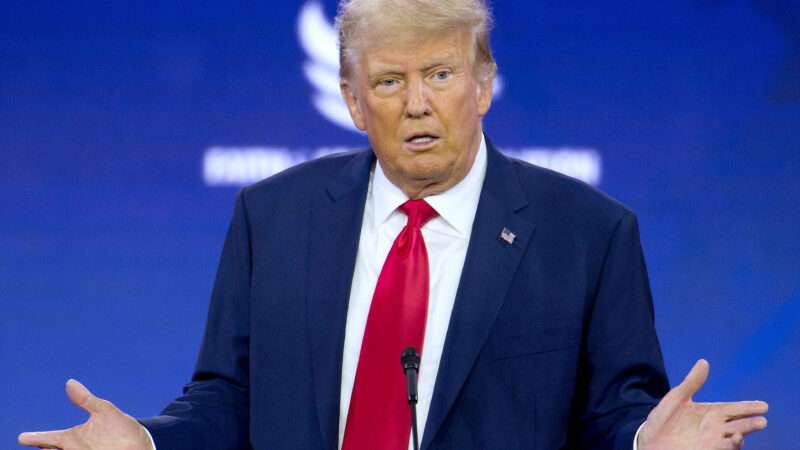
Facing possible indictment in Georgia for his efforts to overturn the results of the 2020 election, former President Donald Trump asked the state's highest court to step in on his behalf. On Monday, the court unanimously declined to do so.
Last week, Trump's legal team filed a petition with the Supreme Court of Georgia, against Fulton County District Attorney Fani Willis and Judge Robert McBurney of the Atlanta Superior Court. The filing sought to disqualify Willis from involvement in the unfolding case against Trump.
In February 2021, Willis opened a criminal investigation into Trump's conduct after the 2020 election—specifically, his January 2, 2021, phone call to Georgia Secretary of State Brad Raffensperger in which he was recorded pressuring Raffensperger to "find 11,780 votes" to win Trump the state. The following year, Willis impaneled a special grand jury with the power to issue subpoenas, expanding her investigation to include any attempts to "disrupt the lawful administration of the 2020 elections" in Georgia. McBurney is the Superior Court judge overseeing the grand jury's proceedings.
The grand jury interviewed around 75 witnesses before concluding in January. While its report has not been fully released, the available evidence indicates bad news for Trump: Willis recently signaled that indictments may be unsealed in August.
In the July 13 filing, Trump asked the court to compel McBurney to "quash" the grand jury's report, "bar its use in regular grand-jury proceedings," and "bar the use of any evidence obtained" in the process "in any subsequent proceedings." It also asked the court to prevent Willis from any further involvement in Trump's case.
On Monday, less than a week after Trump's complaint was filed, the Georgia Supreme Court decided unanimously against him. In an unsigned five-page decision, the court declined to rule on the merits of many of Trump's arguments, contending instead that his filing was improper. Instead of petitioning the superior court and "appeal[ing] from any adverse decision," the judges wrote, Trump was skipping ahead and asking the higher court to "step in and allow him to circumvent the regular judicial process." And while Trump accurately claims that the court would have the legal authority to step in, "he
makes no showing that he has been prevented fair access to the ordinary channels."
Trump's filing cited a litany of complaints, from claiming the law authorizing special grand juries was too "vague" and, therefore, "facially unconstitutional under the 14th Amendment" and the Georgia Constitution, to alleging that Willis has an "impermissible and actual conflict of interest." (Last year, Willis hosted a fundraiser for a Democratic candidate for lieutenant governor after already having named the candidate's Republican opponent, state Sen. Burt Jones, a "target" of her investigation. McBurney barred the grand jury from targeting Jones or issuing subpoenas to him, though he declined to do the same for any other targets of the investigation.)
The filing even complains that the process has gone too fast, observing that "criminal processes, particularly in Georgia, can be ponderously slow," and the fact that this case would proceed so quickly is "grossly unrealistic."
Much of Trump's complaint also hinges on the novelty of the situation. "That this case is extraordinary goes almost without saying," it states. "No prosecutor, state or federal, has ever indicted a former president for conduct committed while in office." In that respect, Trump is correct: It is indeed novel and unprecedented for a former president to be indicted. But that by itself doesn't mean that an indictment is unwarranted. Publicly available evidence of a defeated incumbent leaning on a state official to "find" enough votes for him to carry that state is also novel and unprecedented.
As Eric Boehm wrote in the July 2023 issue of Reason, the Georgia case "could be important in setting clear standards for how much pressure future presidents can exert on state and local election officials."
The Georgia case is just one of several across the country that pose serious legal risk to Trump. In April, the former president was indicted in Manhattan over 2016 hush money payments to pornographic actress Stormy Daniels. And a federal grand jury in Washington, D.C., is considering whether Trump, in his actions after the 2020 election, may have committed federal crimes.
The post Georgia Supreme Court Declines Donald Trump's Request To 'Quash' Grand Jury Report appeared first on Reason.com.







